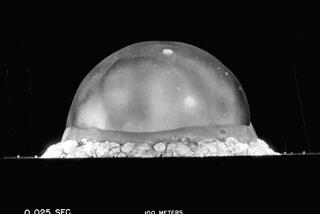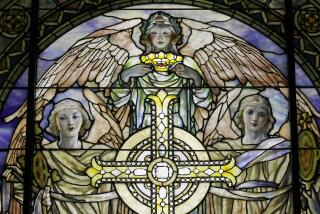Science, Religion Are Discovering Commonality in Big Bang Theory : Creationism: New findings are seen by some as supporting belief that Earth was formed out of chaos by divine intervention.
- Share via
“The most miraculous thing is happening. The physicists are getting down to the nitty-gritty ... and the last thing they ever expected to be happening is happening. God is showing through.”
--From “Roger’s Version” by John Updike The momentous findings supporting the “Big Bang” theory of creation may confirm beliefs that the universe is the work of a majestic guiding hand, some Christians say, providing a common ground for two old antagonists--religion and science.
The latest findings, indicating that an explosive birth billions of years ago led to today’s expanding cosmos of stars and galaxies, reinforce religious themes that order was created out of chaos by divine intervention.
“Christian cosmology and the Big Bang are very compatible understandings of the arrow of time,” the Rev. Frederic B. Burnham, a science historian and director of the Trinity Institute in New York City, said last week. “There was a beginning and there will be an end.”
Astronomers announced last week that they had discovered distant, wispy clouds--or ripples of matter--that indicate how matter that was uniformly spread out in the newborn universe may have started clumping together to produce stars.
That the announcement was greeted with Christian equanimity may be indicative of the new state in the relationship between religion and science.
Many Americans still believe strongly in a traditional, biblically based creation. In a 1991 Gallup Poll, 47% of respondents said God created man pretty much in his present form at one time within the last 10,000 years, while 40% said humans have developed over millions of years, but God guided this process. Only 9% said man evolved without God, while 4% had no opinion.
Centers for the study of science and religion were established at prominent universities in the 1980s. In December, 1987, the Lutheran Church in America and the Lutheran World Federation sponsored a conference for scientists and theologians in Cyprus. Since that conference, an Ecumenical Roundtable for Science and Technology has been meeting yearly in the United States, Burnham said.
In making last week’s announcement, research team leader George Smoot, an astrophysicist at Lawrence Berkeley Laboratory and UC Berkeley, said: “If you’re religious, it’s like looking at God.”
Many scientists would consider the idea that God created the universe “a more respectable hypothesis at this point in time than at any time in the last 100 years,” Burnham said.
Religious views of the Big Bang theory are varied.
Henry Morris, president of the Institute for Creation Research in Santee, Calif., said it was too early to evaluate the new findings. The conservative institute holds that the weight of scientific evidence supports the biblical record that the world was created in six days sometime within the last 10,000 years.
The Rev. Stanley L. Jaki, a scholar in theology and physics at Seton Hall University--who won the 1987 Templeton Prize for Progress in Religion--said Friday that establishing the first moment of existence is a matter of philosophy and theology since it can never be established by science.
“To me, it’s absolutely irrelevant whether the Big Bang stays or doesn’t stay,” he said.
But Burnham said many theologians will find confirmation of the Big Bang theory to be very compatible with the belief that God created the universe out of pre-existent chaos.
“Both the contemporary scientific account and the age-old biblical account assume a beginning,” Harvard astronomer Owen Gingerich told a 1990 colloquy on origins at the Episcopal Church’s Washington National Cathedral.
“And its essential framework, of everything springing forth from that blinding flash, bears a striking resonance with those succinct words of Genesis 1:3: ‘And God said, Let there be light.’ ”
John Mather, NASA’s chief scientist for the Cosmic Background Explorer spacecraft, which made the discovery, said he would encourage even creationists who do not believe in the Big Bang to view the scientific pursuits more positively. “This is the universe that God gave us to look at, and we might as well find out what it is and how it works,” Mather said.
How Were People Created? Gallup poll of Americans. SEX Men By God in the last 10,000 years: 39% Evolved without God: 12% Evolved with God: 45% No opinion: 4% Women By God in the last 10,000 years: 53% Evolved without God: 7% Evolved with God: 36% No opinion: 4% Age 18-29 years By God in the last 10,000 years: 40% Evolved without God: 11% Evolved with God: 48% No opinion: 1% 30-49 years By God in the last 10,000 years: 43% Evolved without God: 9% Evolved with God: 45% No opinion: 3% 50 and older By God in the last 10,000 years: 55% Evolved without God: 7% Evolved with God: 30% No opinion: 8% Education College grad. By God in the last 10,000 years: 25% Evolved without God: 16% Evolved with God: 54% No opinion: 5% Some colllege By God in the last 10,000 years: 40% Evolved without God: 11% Evolved with God: 47% No opinion: 2% H.S. grad By God in the last 10,000 years: 52% Evolved without God: 6% Evolved with God: 38% No opinion: 4% Not H.S. grad By God in the last 10,000 years: 65% Evolved without God: 5% Evolved with God: 23% No opinion: 7% Religion Protestant By God in the last 10,000 years: 53% Evolved without God: 6% Evolved with God: 37% No opinion: 4% Protestant Evan. By God in the last 10,000 years: 70% Evolved without God: 3% Evolved with God: 25% No opinion: 2% Catholic By God in the last 10,000 years: 42% Evolved without God: 7% Evolved with God: 49% No opinion: 2% None By God in the last 10,000 years: 10% Evolved without God: 35% Evolved with God: 43% No opinion: 12% National By God in the last 10,000 years: 47% Evolved without God: 9% Evolved with God: 40% No opinion: 4%






